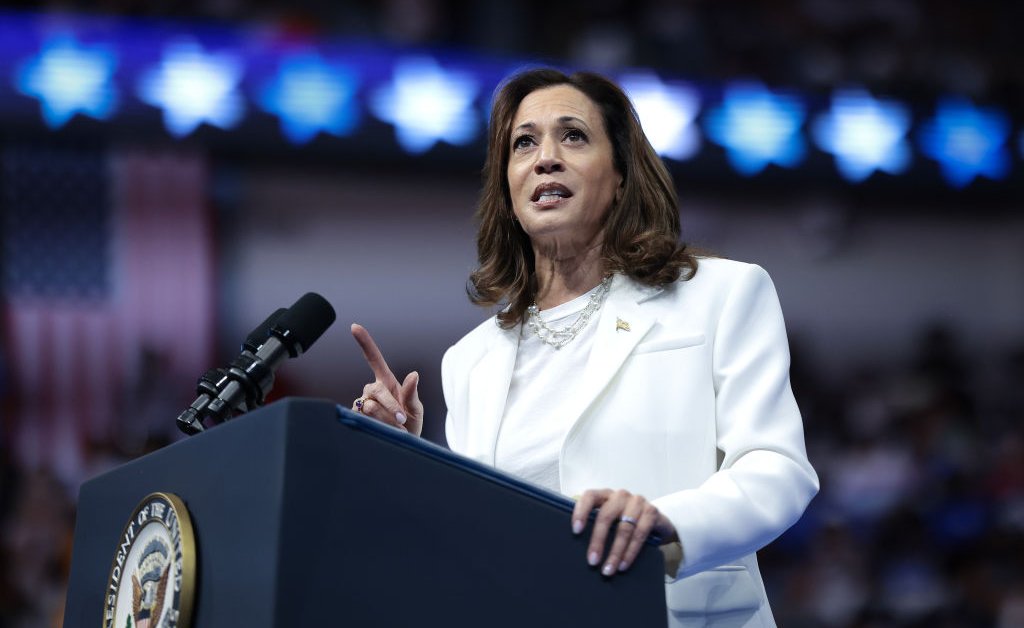In her first interview since becoming the Democratic presidential nominee, Vice President Kamala Harris was joined by her running mate Tim Walz as she sat down opposite CNN’s Dana Bash. If we had to grade the exchange, we would give Harris a proud B+. A good job, but not the A+ of her uplifting delivery at the Democratic National Convention (DNC). The New York Times captured our sentiments when it declared: “Kamala Harris parried questions from CNN’s Dana Bash without causing herself political harm or providing herself a significant boost.”
While watching Harris’ tentative and winding delivery of her solid, thoughtful answers, it was hard to avoid the feeling that she could have better seized the moment with the nation watching. Future interviews could electrify viewers instead of resembling cautious legal depositions. While she avoided the prickly defensiveness of her exchange with NBC’s Lester Holt in 2021, there is still room for improvement.
Harris needs to draw upon her confidence, wisdom, and vision to define each exchange on her own terms as if she is enjoying this near-dizzying popular ride—because she should be.
Here is how Harris can improve her performance in future interviews and convey her points with the same uplifting energy that she transmitted at the DNC.
Play offense, not defense
Harris came off wary in her sit down with Bash, meandering around in circles over her previous policy stances, insisting that her “values had not changed,” and more generally offering answers with tentativeness reflecting the fact she was playing defense, not offense. There was a jarring disconnect between Harris’ rambling interview and her rousing DNC speech, in which she declared: “America, let us show each other and the world who we are and what we stand for: freedom, opportunity, compassion, dignity, fairness, and endless possibilities.” The joy she brought to that speech, which offered compelling reasons for why she is running, shows how her protective interview posture represents a missed opportunity to bring her hopeful message to undecided voters.
Redirect responses towards more favorable ground
Harris was responsive to each of Bash’s questions. Almost too reactive. When Bash asked the Vice President about her previous positions on fracking and how those have evolved, she provided protracted replies on how her values haven’t changed, but her understanding of the practical demands of energy policy have. In doing so, she allowed herself to get dragged into several rounds of follow-up questions on the same topic.
In the case of questions that could lead Harris down an unfavorable path, or unanticipated questions out of left field, Harris must do a better job of redirecting her responses towards more favorable ground. While Harris’ sincerity in responding fully to each of Bash’s questions is commendable, at the same time, that proved to be a missed opportunity in conveying the wisdom she gained serving in high office.
Come in with a set of clear, succinct messages to be conveyed
As several post-mortems have noted, some of Harris’ winding answers were hardly master classes in concision. The New York Times quipped: “She still struggles to be punchy off the cuff… Thursday’s interview was a reminder that unscripted, she can sometimes deliver discursive answers that ramble and zigzag.”
Of course, bringing a script to an unscripted interview never works. But at times, it felt as if Harris’ replies were being tested for the first time akin to a student thinking aloud in class as opposed to tapping into the excitement of fresh insight and original analysis.
Prioritize the most important topics and points
Even when Harris did deliver some powerful lines during the CNN interview, it was easy to lose track of her original point, often buried within dense, rambling answers meandering across a variety of tertiary topics. Her promise to appoint a Republican to her Cabinet—a major news flash moment—seemed to land with a thud as Harris rambled on about how some of the most important decisions are made around the Cabinet table.
That delivery stood in stark contrast to a similar point she confidently made during her DNC acceptance speech, when she declared in a powerful moment: “And let me say, I know there are people of various political views watching tonight. And I want you to know, I promise to be a President for all Americans. You can always trust me to put country above party and self. To hold sacred America’s fundamental principles: From the rule of law to free and fair elections, to the peaceful transfer of power.”
Overall, Harris should be commended for sitting down with CNN, yet with only 65 days left in the truncated campaign, she must learn from her exchange with Bash and put her best foot forward in the future. It’s not enough to merely avoid doing any harm in interviews. Adhering to the Hippocratic Oath may guide the mission of physicians, but not the mission of presidential candidates.




